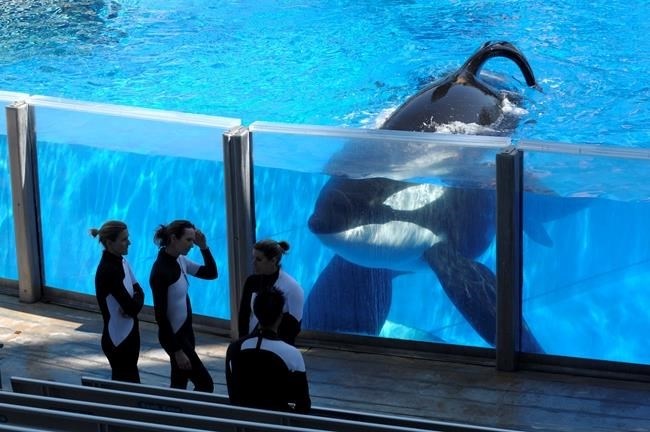
FILE - In this Monday, March 7, 2011, file photo, killer whale Tilikum, right, watches as SeaWorld Orlando trainers take a break during a training session at the theme park's Shamu Stadium in Orlando, Fla. SeaWorld is ending its practice of killer whale breeding following years of controversy over keeping orcas in captivity. The company announced Thursday, March 17, 2016, that the breeding program will end immediately.
Image Credit: AP Photo/Phelan M. Ebenhack, File
March 17, 2016 - 8:30 AM
MIAMI - SeaWorld announced Thursday it will immediately stop breeding killer whales, essentially phasing out the iconic orcas from its theme parks following years of controversy over keeping them in captivity.
Park attendance at SeaWorld dropped after the 2013 release of the documentary "Blackfish," which was highly critical of the orca program. SeaWorld reported a fourth-quarter loss of $11 million in February.
The company appeared to acknowledge that the criticism had helped drive the decision to end the breeding program. It also announced it would stop using the orcas in theatrical shows in the parks, instead introducing "new, inspiring natural orca encounters."
"As society's understanding of orcas continues to change, SeaWorld is changing with it. By making this the last generation of orcas in our care and reimagining how guests will encounter these beautiful animals, we are fulfilling our mission of providing visitors to our parks with experiences that matter," said Joel Manby, president and chief executive officer of SeaWorld Entertainment, Inc.
The new shows will begin next year at the SeaWorld Entertainment Inc.'s San Diego park, before expanding to its San Antonio park and then to the Orlando, Florida, park in 2019.
Orcas have long been a centerpiece of the SeaWorld parks, with shows at the Shamu stadium in San Diego becoming the park's main draw in the 1970s and helped make SeaWorld a top tourist attraction. The San Diego show was the original home of Shamu, SeaWorld's first orca.
In its statement making the announcement Thursday, the company said it was also forming a partnership with the Humane Society to help educate guests on animal welfare and conservation issues through interpretive programs at the parks and by expanded advocacy for wild whales, seals and other marine creatures.
"SeaWorld's commitment to end breeding of orcas is a long-held goal of many animal advocacy organizations, and we commend the company for making this game-changing commitment," said Wayne Pacelle, president and CEO of the Humane Society.
Criticism over keeping killer whales in captivity increased in 2010 after an orca named Tilikum grabbed trainer Dawn Brancheau after a "Dine with Shamu" show and pulled her into the pool, killing her. The death was highlighted in "Blackfish." Tilikum, who was also involved in the deaths of two others, is now very sick. He has been at SeaWorld Orlando for 23 years.
Last month, SeaWorld acknowledged sending workers to infiltrate the animal rights group People for the Ethical Treatment of Animals. At the time, Manby said the employees had been sent to PETA to protect the safety of its employees and customers, but he vowed to end the practice.
PETA, which has been especially critical of SeaWorld, said the company needs to do more for the animals.
"SeaWorld must open its tanks to the oceans to allow the orcas it now holds captive to have some semblance of a life outside these prison tanks," PETA spokeswoman Colleen O'Brien said in a statement.
By August 2014, SeaWorld said it would build new, larger environments for its marine mammals and fund additional research and conservation efforts. The project has yet to get off the ground.
Last October, the California Coastal Commission approved a $100 million expansion of SeaWorld's tanks for its orcas in San Diego but also banned breeding of the captive animals. SeaWorld said it would end the orca shows in San Diego by 2017, and the company also filed a lawsuit saying the California commission had overreached when it banned breeding at that park.
SeaWorld hasn't been alone in dealing with the public outrage that followed "Blackfish" and the 2009 documentary "The Cove," which showed the killing of dolphins in Japan. The National Aquarium in Baltimore announced in 2014 that it would explore retiring its eight dolphins to an oceanside sanctuary, and elected officials in some California cities passed resolutions stating that whales and dolphins have the right to freedom from captivity.
Rep. Adam Schiff, D-Calif., who introduced the Orca Responsibility and Care Advancement Act in 2015, applauded SeaWorld's announcement Thursday.
"These changes are something that advocates have been urging for years, and I think SeaWorld will find that visitors will reward their actions with a renewed interest in the parks," Schiff said in a statement Thursday.
News from © The Associated Press, 2016